Independence is out. “I personally trust them” is in. Welcome to the frontlines of the new old Goodle Boy ethics system.
In late April, I reported on a then-forthcoming Lexington Fayette Urban County (LFUC) Council vote to award the local firm CivicLex a $95,000 contract to study the structure and composition of the city’s appointed boards and commissions. The contract, approved unanimously in mid-May, is the most recent in a string of city contracts and other insider work awarded to the group.
These direct financial and data relationships between the city and CivicLex are a problem, I noted, because the nonprofit defines its mission in part as doing “local news and reporting.” In this city reporter role, the nonprofit actively shapes what news gets reported, and how such news gets reported.

In contracting with the very entity that it is covering, CivicLex pretty openly violates journalism’s “highest and primary” public obligation to remain independent of “real or perceived” conflicts of interest.
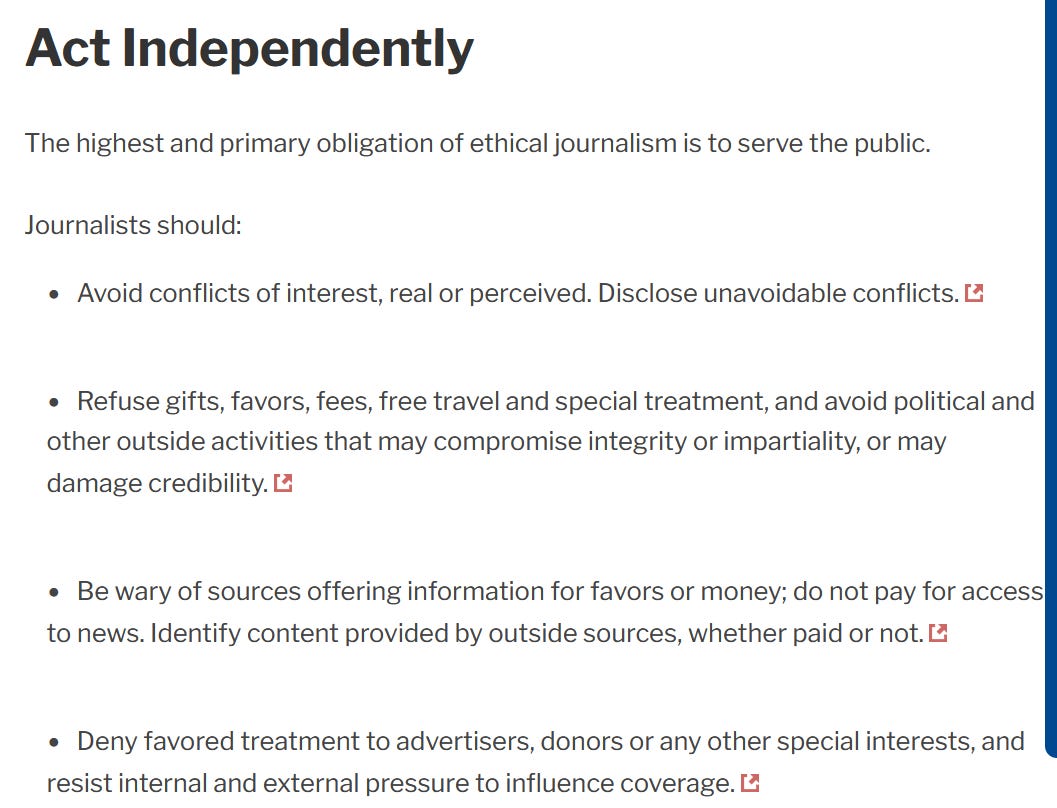
Far from avoiding any appearance of a conflict of interest, CivicLex seems openly to court this conflict as a marketable niche feature. The group claims these open ethical violations as acts of civic health building.
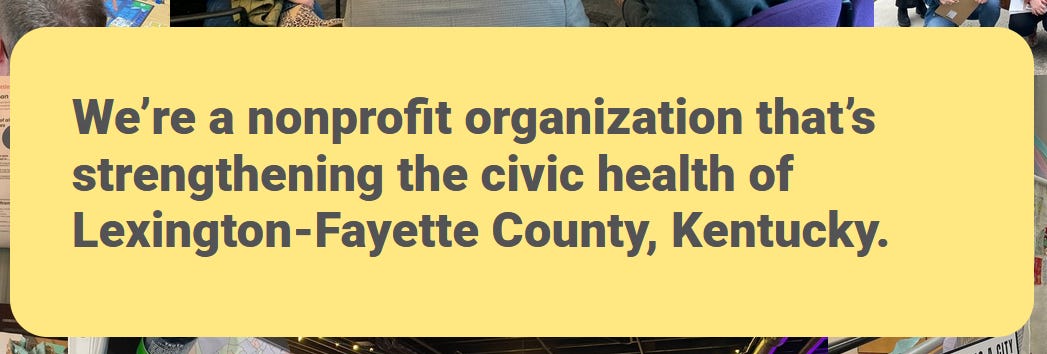
A future article will return to how such contracts undermine the claimed “healthy” civic work of CivicLex. Here, I want to focus on what for me has become the larger story surrounding the nonprofit’s ethical breaches.
Very early on in my work, it became clear that, in order to get an unbiased response from someone in the media, I could not expect to rely on my community’s own set of journalists. I ended up cold-contacting a journalism professor at my alma mater, the University of Georgia, who I guessed would be unconnected to CivicLex money and influence.
What I found when reaching out to area journalists for comment on CivicLex’s contract work were not references to their profession’s highest written ethical framework: independence. What I mostly got instead were various ad hoc appeals (if they responded at all) that sidestepped their profession’s ethics in order to vouch personally for CivicLex’s organizational virtue.
This is not independent journalism so much as it is just trust me journalism. It should have some serious implications for how we receive and understand the local news that these same people and organizations put on display for us to consume.
The Kentucky Lantern, Eastern Standard & Al Cross
Over the past month, I contacted local media outlets to inquire whether they engaged in city or state contracts.
Here is my query to the Kentucky Lantern. Like CivicLex, the Lantern is a somewhat recently formed nonprofit media outlet. Where CivicLex does local news, the Lantern does state-wide journalism with a focus on central and northern Kentucky.
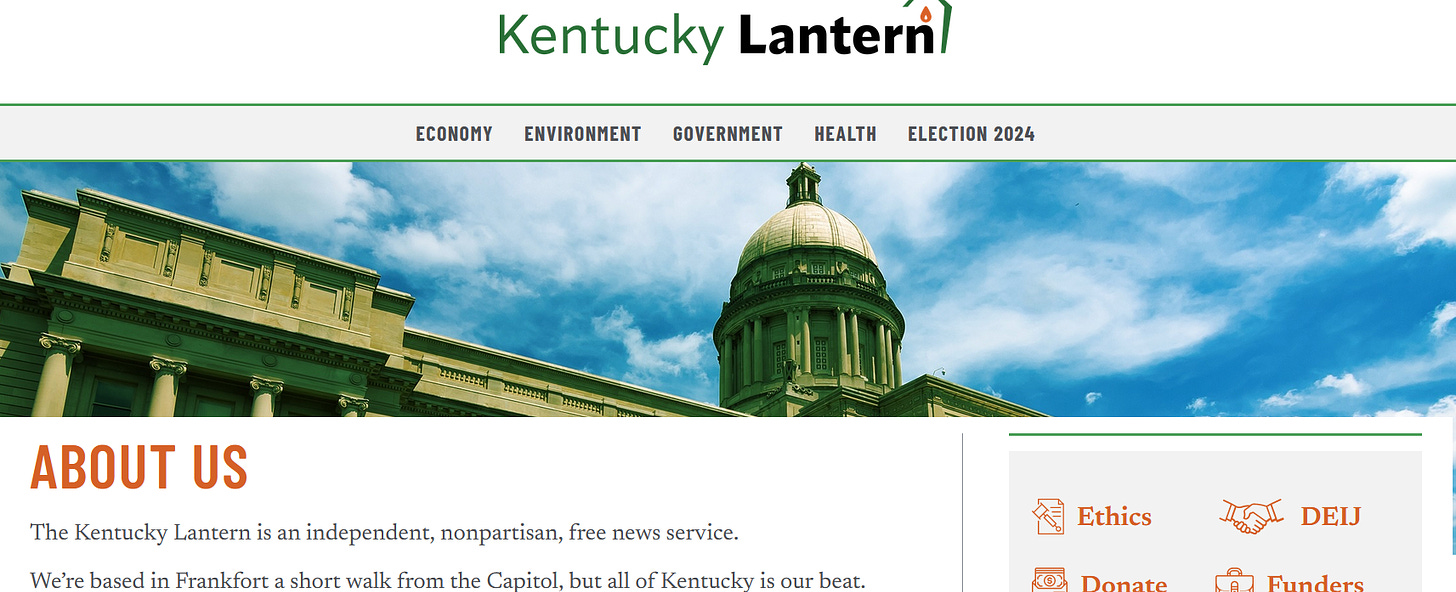
I wrote:
Mary Cornatzer,
I write for North of Center and am inquiring about Lantern policy in regard to government contracts. I took a look at your helpful ethics link but wanted to ask about a more specific example:
Is the Lantern able to accept any contracts for local or state government work? Why or why not? This is for an article I am writing.Thanks, Danny Mayer
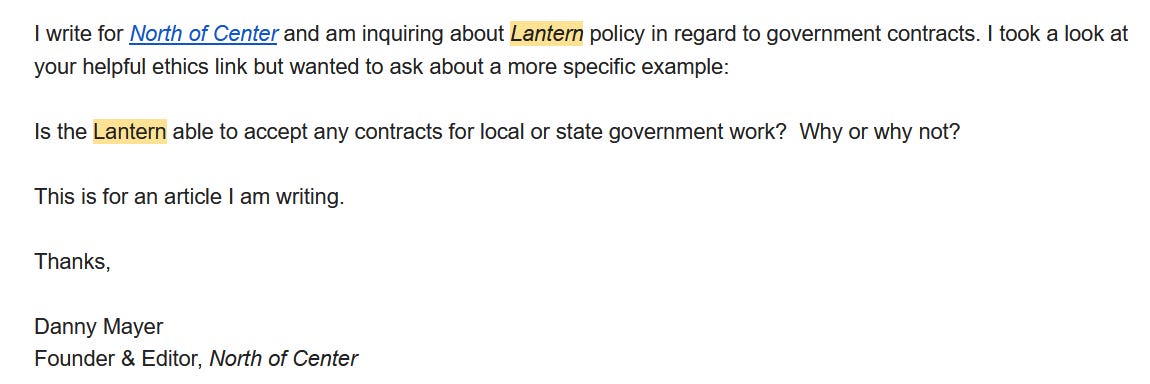
The Lantern did not directly answer why the news outlet adheres to its policies. But it was clear: “The Kentucky Lantern does not accept government contracts.” Presumably this owes to the Lantern’s adherence to the Society of Professional Journalist’s guidelines cited above, which prohibit even the appearance of a conflict of interest.
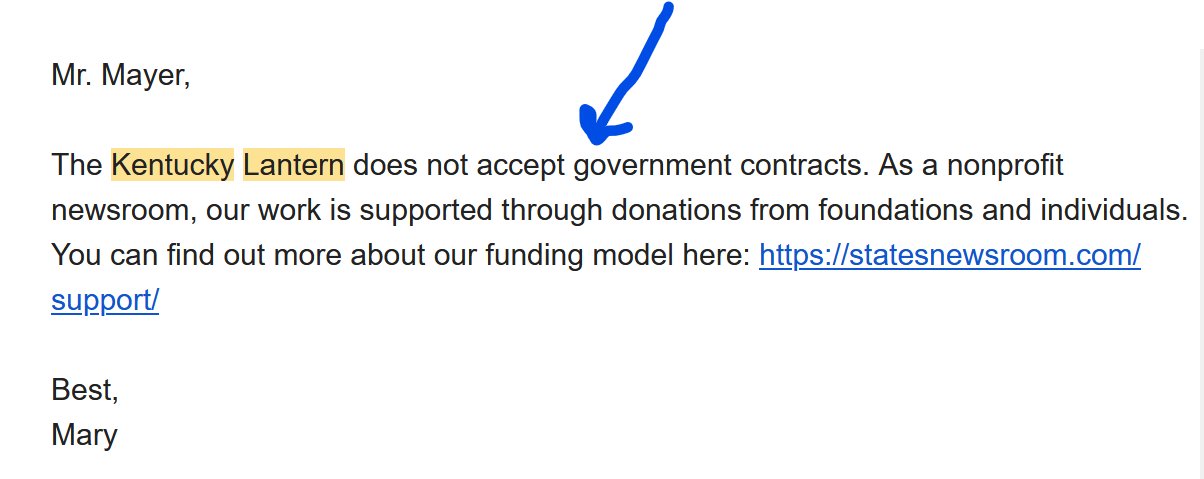
Indeed, the Lantern policies do forbid receiving money from foreign governments. Accepting money from local governments, it would seem, appears to fall so far outside the bounds of normal as to not even merit a disclaimer.

The Lantern’s was a standard response.
Spoiler alert: Nobody who responded to me could name a media outlet that would cop to directly engaging in financial and data contracts with the very governmental people who they cover. Even shameless national security experts and congressional lobbyists exit public government before excepting positions at the leading shameless media outlets.
I contacted Tom Martin of NPR station WEKU’s Eastern Standard. I wrote:
I write for North of Center, a small outlet publishing from Lexington, KY, since 2009. I am working on a piece that involves a question of journalism ethics and hoped you could comment as the head of WEKU’s Eastern Standard.
(1) Is Eastern Standard allowed to take any government contracts for work performed for the entities it covers? In other words, can Eastern Standard take a state contract from lawmakers in Frankfort, or from elected officials in Whitesburg?
(1b) If so, why? If not, why not? (I’m looking for the ethical or other guidelines that would inform your decision.)(2) Are you aware of any examples where media outlets have received government contracts to audit or otherwise work directly for a local, state or federal government?
Thanks for your response, Danny Mayer

Martin gave a quick and pretty straightforward reply in bullet-point format, befitting the softball ethical question that I had posed to him and other journalists. The bolding is mine:
- Easy answer to #1: of course not. We’re public radio and as a member station, adhere to the Standards & Practices of NPR, as well as the Code of Ethics of the Society of Professional Journalism (click here for our series on the subject.)
- An equally easy response to #1b: because to do so would certainly violate those Standards and the Code and, in any case, is just plain wrong and would create a conflict of interest in violation of the trust of our listeners, whom we respect.
- #2: No
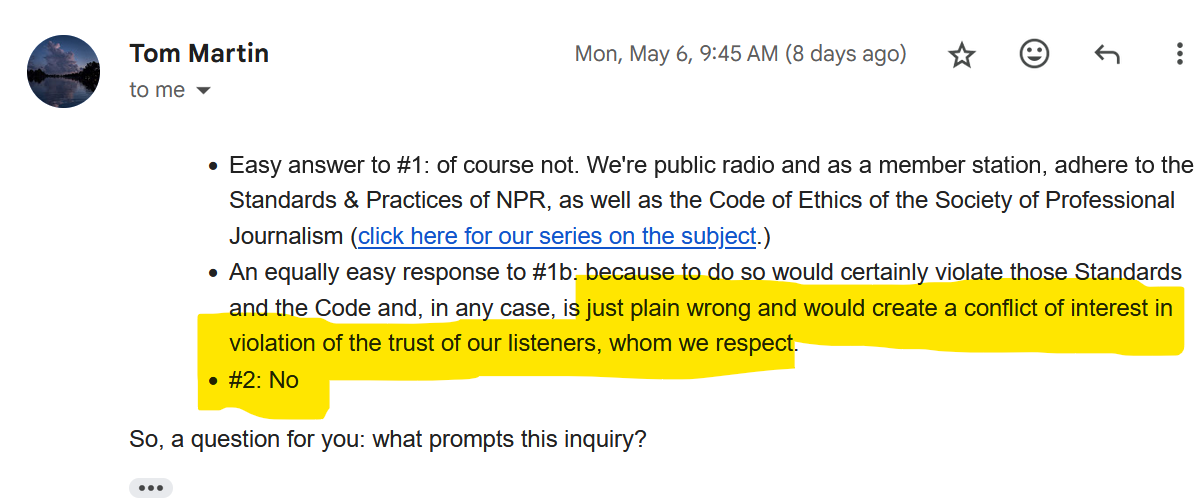
Allow me to further amplify Tom Martin’s response, which the Eastern Standard host characterizes as an “easy” one.
Accepting government contracts is “just plain wrong and would create a conflict of interest in violation of the trust of” the news organization’s listeners and readers. In Martin’s long career employed at a number of national and local news outlets, he was not aware of any media outlets who would violate the trust of their news consumers. Acceptance of such contracts, he implies, would be disrespectful to those news consumers (you and me).
As with my email to the Lantern, I chose not to mention CivicLex in my query to Martin. I instead asked an abstract question focused on personal experience and professional practice.
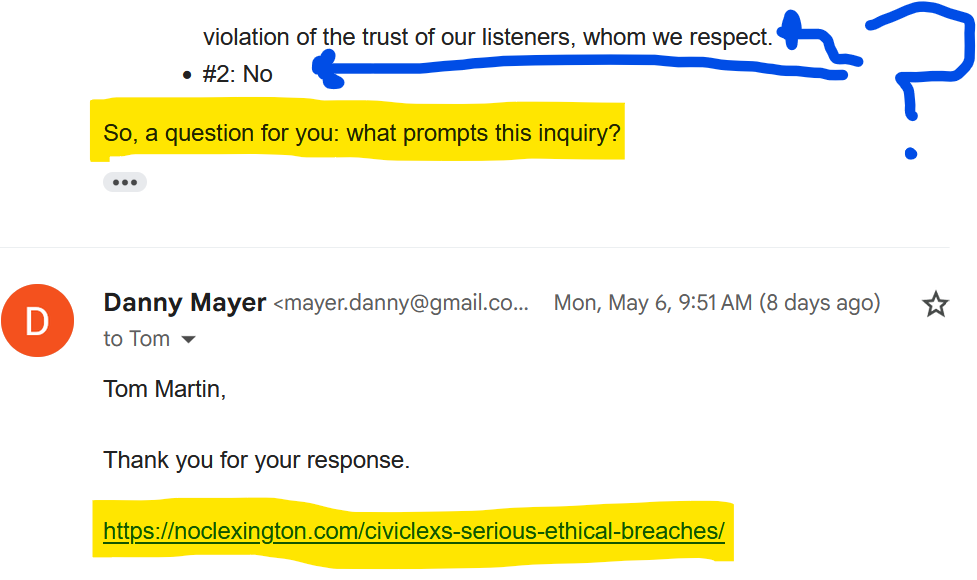
Martin demonstrates my reason for omission. In a series of increasingly agitated emails to me, Martin flip-flopped once he became aware that the just-plain-wrong, conflict-of-interest, violation-of-trust, disrespectful-to-its-news-consumers media outlet in question was…CivicLex.
I have more on my strange interactions with Martin in this companion piece, which is a sort of close email reading of the implosion of the field’s local ethics system. In content, Martin offered a strikingly similar reason given me by another well-known regional journalist who I had contacted, Al Cross. So let’s turn to him.

There is perhaps no more decorated figure in Kentucky journalism than Al Cross. Twenty-six years at the Courier Journal. Director emeritus of the University of Kentucky’s Institute for Rural Journalism. Pulitzer Prize winner. Longest-running panelist on Kentucky Education Television’s “Comment on Kentucky.” One-time panelist for the national “Washington Week In Review.” And, relevant to my focus on CivicLex, a former president of the Society of Professional Journalists (SPJ), the nation’s oldest, broadest and largest journalism organization. In 2011, in fact, Cross received SPJ’s top award for service.
Cross was the first person I contacted while researching my story on CivicLex. Unlike most UK faculty I’ve encountered over the years, the dean of state journalism was quick and gracious with his response. Cross provided me the SPJ ethics document that has guided my criticism of CivicLex’s work. He also put me in contact with Liz Hansen, another leading regional journalist who once served on the SPJ national ethics committee. (Hansen never responded to me, though she appears in the Tom Martin companion piece referenced above.)
However congenial, Cross’s explanation was hard to jive with the journalism ethics that he circulated to me and upon which his professional standing rests. And when I followed up to ask about the inconsistencies between his specific stance on CivicLex and the broader ethical document he provided me, Cross ghosted me.
In his response, Cross made a strange distinction between “old” journalism and what I understood him to mean as a “new” form—a CivicLex journalism.
“In the old days,” he wrote in reference to his profession’s long-established ethical guidelines, “no traditional news outlet would engage in such a thing, because its independence might be compromised.”
These ethical considerations, Cross continued, did not apply to CivicLex. The outlet (1) did not do investigative reporting; (2) had “a narrower mission” of helping people hold their government accountable [?]; and (3) demonstrated full transparency in announcing their contract work. (Cross did not mention that CivicLex has been blessed with at least one invited speaking engagement at the Institute for Rural Journalism, where Cross is Director Emeritus, and is the current Community Innovation Partner at UK, where his Institute is housed.)
Curiously, the much decorated journalism expert presented his own views on his profession’s ethics system (a profession for which he served as national leader of the premier organization that also sets the field’s ethical guidelines) as “just one person’s opinion.”
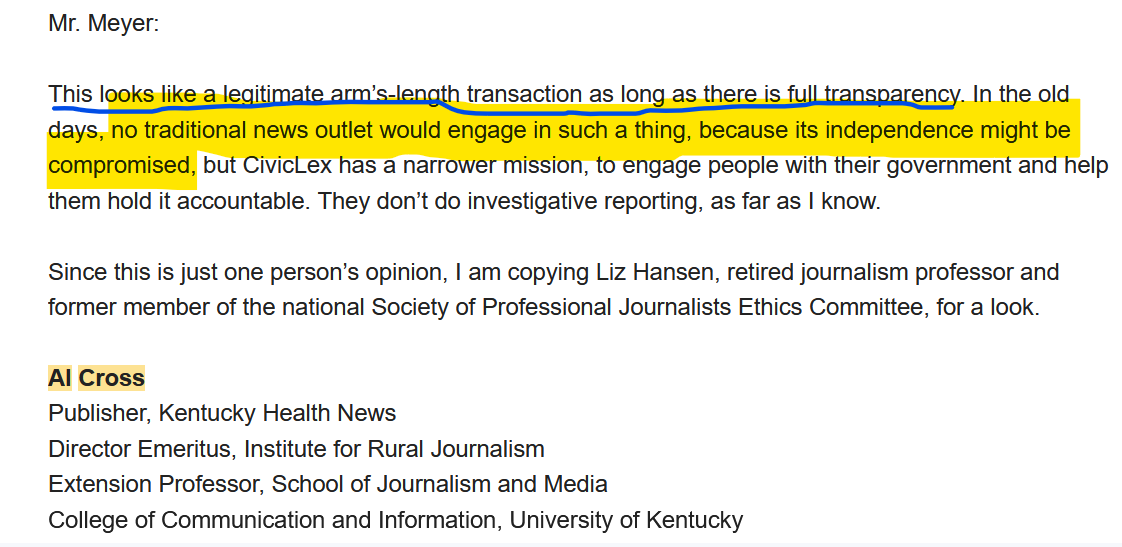
For you lay people, a quick correction to Cross’s statement.
The guidelines for practicing ethical journalism make no distinction between “investigative” journalism and other forms. Ethically speaking, Cross’s profession treats journalism as journalism. In all its forms, media outlets are expected to avoid the appearance of a conflict of interest as the “highest” obligation of the field’s need for independence. If we can’t trust it, it’s worthless. Or worse.
Universality is in fact also the fundamental basis of ethics more generally, which do not operate on a case by case basis. Ethics are about fair application to all. We don’t expect doctors to selectively apply a Hippocratic Oath, PVA administrators to skip home assessments for certain neighbors, or politicians to accept bribes from good-seeming people.
Cross’s statement redefines both the concept of an ethics system generally, and the specific application of it in his own professional field.
Local ethics & getting the local news
Last month, LFUC Council voted unanimously to award CivicLex its $95,000 contract to analyze the city’s 70 boards and commissions. Like all previous CivicLex contracts with the city, local media did not report on this out-in-the-open ethical breach. (The Times, which also circulates my work, is a notable exception.)
In the absence of any reporting, one can only assume that Cross and Martin’s ethics-bending views hold for the rest of the community of journalists who report the news here. It’s not newsworthy.
If this be the case, it should be stated: our area’s media professionals are not just endorsing the unethical practices of a local up-and-coming, nationally-funded, media outlet with a growing presence in city decision-making bureaucracy and a number of former board members now serving as elected council members. These silent journalists themselves also breach a second pillar of their profession’s ethical guidelines.
To maintain their profession’s core function as a “watchdog” for accountability and transparency, the journalist has a duty to expose unethical conduct in the field itself.
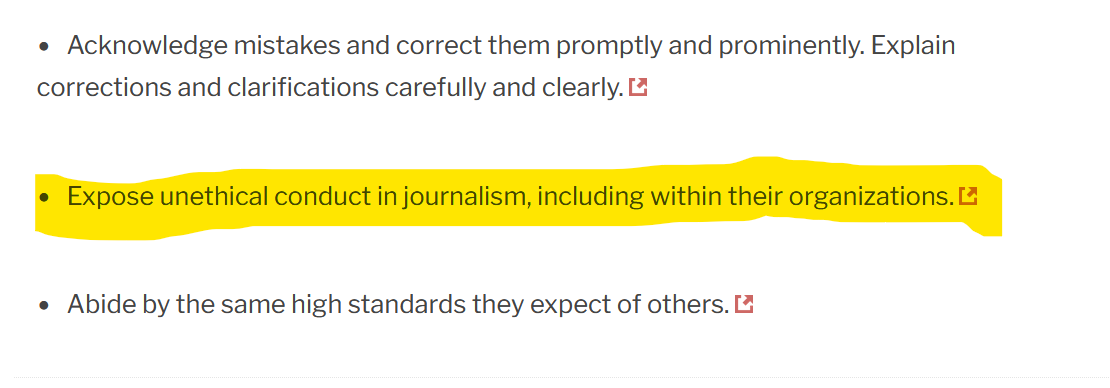
Will any journalist around here do that?

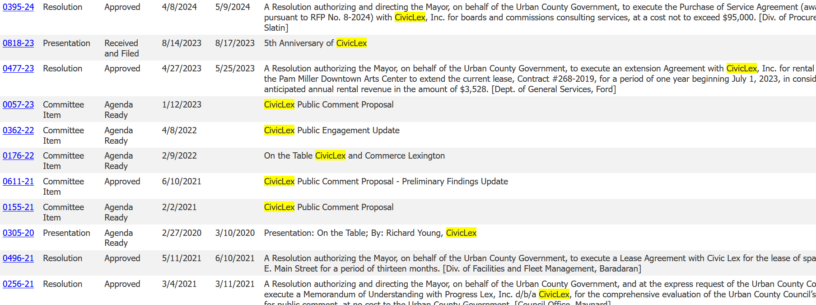


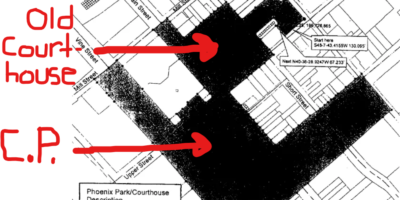
Leave a Reply